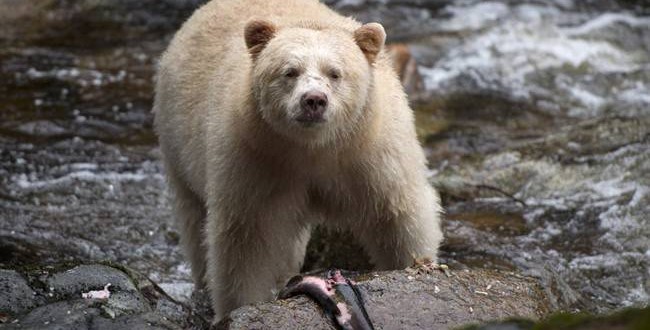The provincial government and over 20 First Nations signed agreements in Vancouver today that finalize land use planning for the central and northern coast of British Columbia.
The deal, which will be enshrined in legislation this spring, applies to a stretch of 6.4 million hectares of the coast from the north of Vancouver Island to the Alaska Panhandle. It promises to protect 85 per cent of the region’s old-growth forests, with logging in the remaining 15 per cent subject to the most stringent commercial logging standards in North America.
Representatives for the four partners gathered for a ceremony in the Heiltsuk community of Bella Bella on Friday to mark the completion of an accord that reaches far beyond the original objectives of protecting ancient forests and the home of the unique white-furred black bear known as the Spirit Bear.
The final agreement also recognizes aboriginal rights to shared decision-making and improves economic opportunities for the 26 First Nations that reside in the region with a greater share of timber rights and $15-million from the province.
In Bella Bella’s school gymnasium, hereditary chiefs wearing their regalia of button blankets and ermine-trimmed headdresses danced and a chorus of children sang to welcome Premier Christy Clark and the chief architects of the deal.
In the 1990s, frustrated over what they saw as destructive forestry practices on their traditional lands, First Nations partnered with environmentalists to fight back against logging companies, blockading roads and protesting.
By the early 2000s, environmental groups and industry players, including Interfor Corp, Western Forest Products Inc and Catalyst Paper Corp, had started talks. At the same time, government began negotiating with the Coastal First Nations and Nanwakolas Council.
The final agreements, reached more than a decade later, will “help mitigate climate change, support improved community wellbeing, and provide economic certainty to the forestry sector”, environmental groups that engaged in the process said.
The deal will also see the end of the commercial grizzly bear hunt within Coastal First Nations territories, though other existing tourism-related businesses will not be affected.
Agencies/Canadajournal
 Canada Journal – News of the World Articles and videos to bring you the biggest Canadian news stories from across the country every day
Canada Journal – News of the World Articles and videos to bring you the biggest Canadian news stories from across the country every day



